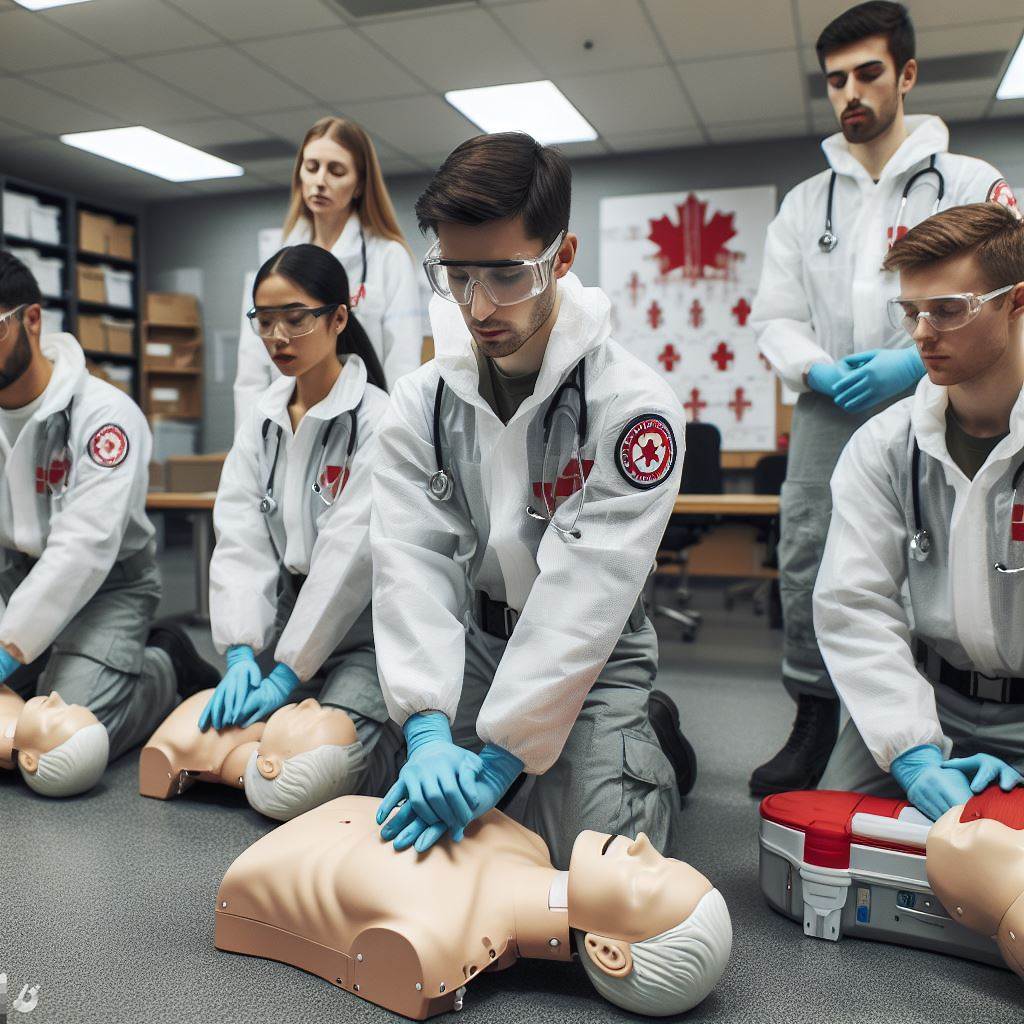Introduction
In the diverse landscape of Canadian pharmacy careers, understanding the distinctions between retail and hospital settings is vital.
Exploring these sectors unveils unique professional landscapes and responsibilities.
Explanation of the Topic
Retail pharmacies thrive in community settings, serving diverse populations with varying needs and medication demands.
Conversely, hospital pharmacies operate within healthcare institutions, focusing on acute care, specialized medications, and in-depth patient consultations.
Brief Mention of Differences
Retail pharmacies, often more accessible, cater to day-to-day prescriptions, offering broader services but limited to non-compounded medications.
Hospital pharmacies provide comprehensive care, handling critical cases, compounding medications, and collaborating closely with healthcare teams for complex therapies.
Hospital pharmacists engage in interdisciplinary collaborations, impacting critical treatment decisions, while retail pharmacists emphasize patient counseling and over-the-counter solutions.
The roles differ in scope, with hospital pharmacists delving into research and clinical trials, while retail pharmacists prioritize customer service and medication dispensing.
Understanding the distinctions between retail and hospital pharmacy in Canada unveils career pathways.
It’s crucial to explore these sectors’ nuances for aspiring pharmacists, shaping their professional journey according to their passions and aspirations.
Overview of Retail Pharmacy
In Canada, retail pharmacies play a vital role in the healthcare system by providing medications and pharmaceutical services directly to the public.
Definition and role of a retail pharmacist
- A retail pharmacist is a healthcare professional who dispenses prescription drugs and over-the-counter medications in a community pharmacy setting.
- They interact directly with patients, healthcare providers, and pharmacy technicians.
- Their primary role is to ensure the safe and effective use of medications.
Responsibilities and daily tasks of a retail pharmacist
- Reviewing and interpreting prescriptions to ensure accuracy and appropriateness.
- Dispensing medications and providing clear instructions on proper usage.
- Monitoring drug interactions and potential side effects.
- Managing inventory and ordering medications.
- Collaborating with healthcare providers to optimize patient care.
Importance of customer service and patient counseling in retail pharmacy
Customer service plays a crucial role in retail pharmacy, as pharmacists are often the first point of contact for patients seeking medical advice.
Patient counseling is essential to ensure proper medication adherence, avoid potential drug interactions, and minimize adverse reactions.
- Pharmacists provide personalized medication counseling to educate patients about their prescriptions.
- They address any questions or concerns, explain medication side effects, and highlight precautions.
- Through patient counseling, pharmacists promote patient safety, positive health outcomes, and overall wellness.
In addition to counseling, retail pharmacists also provide services such as flu shots, cholesterol screenings, and medication reviews to support proactive healthcare.
They collaborate with other healthcare professionals to deliver comprehensive patient-centered care.
Overall, retail pharmacy in Canada is a vital component of the healthcare system, ensuring safe and accessible medication services to the public.
Pharmacists in retail settings not only dispense medications but also play a significant role in promoting optimal patient health outcomes through customer service and patient counseling.
Their expertise and commitment to patient care contribute to the overall well-being of individuals and communities.
Advantages of Retail Pharmacy in Canada
When it comes to providing pharmaceutical services in Canada, retail pharmacies have distinct advantages over hospital pharmacies.
These advantages contribute to the accessibility, convenience, product availability, and quality of patient care offered by retail pharmacies.
Accessibility and Convenience for Patients
- Retail pharmacies are easily accessible to the general public as they are scattered throughout various communities.
- Patients can conveniently find a retail pharmacy nearby, saving them time and effort in seeking healthcare.
- Most retail pharmacies operate extended hours and some even offer 24/7 services, ensuring patients can obtain medications when needed.
Availability of Over-the-Counter Medications and Health Products
- Retail pharmacies carry a wide range of over-the-counter medications, allowing patients to self-treat common health issues.
- They also provide various health products such as vitamins, supplements, and personal care items.
- The availability of these products promotes self-care and empowers patients to manage minor ailments on their own.
Opportunity for Pharmacists to Interact with a Larger Patient Population
- Retail pharmacies serve a larger patient population due to their accessibility, attracting diverse individuals seeking healthcare.
- Pharmacists employed in retail settings have the opportunity to interact with a wide range of patients, helping them understand their medications.
- These interactions allow pharmacists to offer counseling, advice, and answer questions, contributing to better patient outcomes.
Overall, retail pharmacies in Canada play a crucial role in providing accessible and convenient healthcare services.
The advantages they offer, such as patient accessibility, product availability, and pharmacist-patient interactions, contribute to the overall well-being of Canadians.
Challenges in Retail Pharmacy
Working in a retail pharmacy in Canada poses unique challenges that pharmacists must navigate on a daily basis.
From a high workload and pressure to dealing with insurance claims and inventory management, these challenges require efficient and effective skills to overcome.
High workload and pressure due to large customer base:
- Managing a large customer base can be overwhelming, leading to a high workload and increased pressure on retail pharmacists.
- The constant flow of customers can make it challenging to provide personalized care and ensure that each patient’s needs are met.
- Balancing multiple responsibilities while serving customers efficiently is crucial.
Dealing with insurance claims, inventory management, and documentation
- Retail pharmacists must handle insurance claims on behalf of customers, ensuring that medications are covered and properly reimbursed.
- Inventory management is essential to prevent stockouts and ensure that the pharmacy always has the necessary medications available.
- Meticulous documentation is required to comply with regulatory standards and maintain accurate records.
Limited ability to provide specialized care or work with complex medical cases
- Retail pharmacists often have limited resources and time to provide specialized care to patients.
- They may not have the capacity to fully understand and address complex medical cases that require in-depth knowledge and expertise.
- Referring patients to specialized healthcare professionals becomes necessary in such situations.
Basically, retail pharmacists in Canada face various challenges that impact their ability to deliver the best care possible.
The high workload and pressure, combined with the need to handle insurance claims, inventory management, and documentation, require efficient organizational and time management skills.
Additionally, the limited ability to provide specialized care or work with complex medical cases necessitates collaboration with other healthcare professionals.
Despite these challenges, retail pharmacists play a vital role in the healthcare system by ensuring patients have access to the medications they need.
Read: How to Become a Pharmacist in Canada
Overview of Hospital Pharmacy
In Canada, hospital pharmacies play a crucial role in providing healthcare services to patients within a hospital setting.
Unlike retail pharmacies, which serve the general public, hospital pharmacies focus on meeting the medication needs of hospitalized individuals.
Definition and Role of a Hospital Pharmacist
A hospital pharmacist is a licensed healthcare professional who specializes in the field of pharmacy and works within a hospital or other healthcare institutions.
Their primary role is to ensure the safe and effective use of medications for patients.
They collaborate closely with other healthcare professionals, including physicians, nurses, and other specialized medical staff, to optimize medication therapy and promote positive patient outcomes.
They provide expert advice on medication selection, dosages, administration methods, and potential drug interactions.
Responsibilities and Daily Tasks of a Hospital Pharmacist
- Compounding and dispensing medications to be administered to hospitalized patients.
- Reviewing patient medical records and medication profiles to ensure appropriateness and safety.
- Monitoring patient responses to medications and adjusting therapy as necessary.
- Providing medication counseling and education to patients and their families.
- Participating in medication-related quality improvement initiatives and research projects.
- Managing medication inventory, including procurement, storage, and proper disposal.
- Contributing to the development and implementation of hospital pharmacy policies and protocols.
- Providing drug information services to healthcare professionals and patients.
Importance of Collaboration with Healthcare Professionals in a Hospital Setting
Collaboration between hospital pharmacists and other healthcare professionals is essential for delivering high-quality patient care.
Their expertise in medication management complements the skills of other team members, resulting in improved patient outcomes.
By working together, healthcare professionals can ensure the appropriate use of medications, prevent adverse drug events, and optimize treatment plans.
Hospital pharmacists contribute to interdisciplinary rounds, providing valuable insights into medication-related issues, such as drug interactions, adverse effects, and medication reconciliation.
In addition, hospital pharmacists play a vital role in medication safety initiatives through their involvement in medication error reporting systems, drug utilization evaluations, and medication-related policies and guidelines.
Overall, hospital pharmacies and pharmacists serve as integral members of the healthcare team, working collaboratively to provide optimal medication therapy for patients within a hospital setting.
Unlock Your Career Potential
Visualize a clear path to success with our tailored Career Consulting service. Personalized insights in just 1-3 days.
Get StartedHospital pharmacists in Canada have specific roles and responsibilities that set them apart from retail pharmacists.
Their focus on serving hospitalized patients and their expertise in medication management contribute to improved patient outcomes and overall healthcare quality.
Through their collaboration with other healthcare professionals, hospital pharmacists ensure the safe and effective use of medications, promote medication safety initiatives, and contribute to interdisciplinary patient care.
Their dedication and expertise make them indispensable members of the healthcare team in a hospital setting.
Read: A Day in the Life of a Canadian Pharmacist

Advantages of Hospital Pharmacy in Canada
Working in a hospital pharmacy setting in Canada offers numerous advantages for pharmacists.
These advantages not only allow pharmacists to enhance their skills and knowledge but also contribute to improved patient care.
Opportunities to work with specialized medical teams and complex cases
One of the major advantages of working in a hospital pharmacy is the opportunity to work with specialized medical teams and handle complex cases.
Hospital pharmacists collaborate with a wide range of healthcare professionals, including physicians, nurses, and other specialists.
This interdisciplinary approach enables pharmacists to broaden their knowledge and understanding of various medical fields.
Involvement in medication management and therapy selection
Hospital pharmacists play a crucial role in medication management and therapy selection.
They actively participate in optimizing drug therapy for patients, ensuring they receive the most appropriate and effective treatment.
Pharmacists provide accurate drug information, monitor for potential drug interactions, and support healthcare teams in making informed decisions regarding medications.
Potential for research and advancement in clinical pharmacy
Another advantage of hospital pharmacy in Canada is the potential for research and advancement in clinical pharmacy.
Hospital pharmacists often have opportunities to engage in research projects that focus on improving patient care and enhancing pharmaceutical practices.
Through research, pharmacists can develop and implement evidence-based approaches, contributing to advancements in clinical pharmacy and improving patient outcomes.
Hospital pharmacy provides a dynamic and challenging work environment.
Pharmacists continuously encounter complex cases and unique medical situations, which foster the development of critical thinking skills.
This setting allows for continuous learning and growth, as pharmacists are exposed to a wide range of disease states and treatment modalities.
In fact, hospital pharmacy in Canada offers significant advantages for pharmacists.
The opportunity to work with specialized medical teams, involvement in medication management and therapy selection, and potential for research and advancement in clinical pharmacy are just a few of the benefits.
These advantages enable pharmacists to provide comprehensive patient care, contribute to advancements in pharmaceutical practices, and further their professional development.
Read: Day in the Life of a Canadian Doctor: Real Stories
Challenges in Hospital Pharmacy
Strict regulations and protocol adherence
- Hospital pharmacists must adhere to strict regulations and protocols to ensure patient safety and quality care.
- This includes verifying prescriptions, accurately dispensing medications, and providing medication counseling.
- Failure to follow these regulations can result in serious consequences such as medication errors or patient harm.
- Pharmacists must stay updated on the latest guidelines and ensure compliance with changing regulations.
Shift work and demanding schedules
- Hospital pharmacy often involves working rotating shifts and irregular hours.
- Pharmacists may have to work evenings, weekends, and even overnight shifts.
- This can lead to disrupted sleep patterns, fatigue, and difficulty maintaining work-life balance.
- Managing unpredictable schedules can be challenging, especially for those with family or personal commitments.
Potential exposure to contagious diseases and hazardous medications
- Hospital pharmacists are frequently exposed to contagious diseases, putting them at risk of infections.
- They must take necessary precautions, such as wearing personal protective equipment and practicing proper hygiene.
- In addition, hospital pharmacists handle hazardous medications that can pose health risks if not handled properly.
- They must follow strict safety protocols to minimize the risk of accidental exposure and ensure their own well-being.
All in all, hospital pharmacy presents several challenges that pharmacists must overcome to provide optimal care.
Strict regulations and protocol adherence are crucial to ensuring patient safety and preventing medication errors.
However, this also requires continuous education and staying up-to-date with changing guidelines.
Shift work and demanding schedules can be physically and mentally exhausting for hospital pharmacists.
The irregular hours and disrupted sleep patterns can affect their overall well-being and work-life balance.
It requires effective time management and self-care strategies to cope with the demanding nature of this profession.
Hospital pharmacists face potential exposure to contagious diseases, especially in settings like infectious disease units or during pandemics.
They have to take necessary precautions to protect themselves and prevent the spread of infections.
Additionally, they handle hazardous medications, which require strict adherence to safety procedures to avoid accidental exposure.
Despite these challenges, hospital pharmacy also offers unique opportunities for pharmacists.
They play a vital role in interdisciplinary healthcare teams, collaborating with physicians and nurses to optimize patient outcomes.
They have the chance to work with complex medication regimens and contribute to medication management strategies.
Most importantly, hospital pharmacy in Canada comes with its fair share of challenges.
Strict regulations, unpredictable schedules, potential exposure to contagious diseases, and hazardous medications can make this profession demanding.
Read: How to Become a Doctor in Canada: A Step-by-Step Guide
Delve into the Subject: Pharmacy Innovations: Canada’s Outlook
Comparison between Retail and Hospital Pharmacy in Canada
Key Differences in the Work Environment and Patient Interactions
- Retail pharmacists work in community settings, interacting directly with patients on a daily basis.
- They provide medication counseling, answer questions, and offer over-the-counter recommendations to customers.
- Hospital pharmacists, on the other hand, are based in medical facilities and primarily interact with healthcare professionals.
- They focus on clinical aspects, like drug dosing, monitoring, and providing specialized medications for patients.
- Retail pharmacists often have a faster-paced environment, handling multiple prescriptions at once and dealing with a diverse range of conditions.
- Hospital pharmacists have a more structured environment, collaborating with doctors to optimize medication therapy.
Contrasting Levels of Job Security and Potential for Advancement
- Retail pharmacy offers a greater level of job security due to the abundance of positions available in various community settings.
- It also provides opportunities for ownership and potential career growth through managing or owning independent pharmacies.
- Hospital pharmacy positions are more limited, making job security relatively lower.
- However, they offer avenues for specialization within clinical pharmacy, research, teaching, or working in collaborative healthcare teams.
- Hospital pharmacists can pursue advanced clinical roles and positions in pharmacy management, impacting patient care on a larger scale.
Varying Levels of Compensation and Benefits
- Retail pharmacists usually earn higher salaries compared to hospital pharmacists, reflecting the demand for their services.
- Furthermore, retail pharmacists may receive bonuses based on sales and performance metrics.
- Hospital pharmacists, although having a relatively lower salary range, often benefit from more stable working hours.
- They typically enjoy comprehensive benefits packages, including pension plans, extended healthcare, and paid time off.
- Retail pharmacists might face longer working hours, including weekends and evenings, with fewer benefits.
In general, while both retail and hospital pharmacy play indispensable roles in the Canadian healthcare system, they have notable differences.
Retail pharmacists have more direct patient interactions and faster-paced environments, with higher job security and potential for owning independent pharmacies.
On the contrary, hospital pharmacists primarily collaborate with healthcare professionals, focusing on clinical aspects.
Although hospital pharmacists may experience more limited job security, they have the opportunity for specialization and impacting patient care at a larger scale.
Additionally, retail pharmacists tend to earn higher salaries, but hospital pharmacists often enjoy more stable working hours and comprehensive benefits packages.
Each path offers unique advantages, allowing pharmacists to choose the environment that aligns best with their professional goals and interests.
Considerations for Future Pharmacy Professionals
Reflection on Personal Interests and Career Goals
- Assessing personal interests and career goals is crucial for pharmacy professionals.
- Reflect on whether retail or hospital pharmacy aligns better with your aspirations.
- Consider the type of patients you want to serve and the work environment you prefer.
- Evaluate your passion for direct patient interaction or interest in clinical research.
Advantages and Challenges to Consider before Choosing Retail or Hospital Pharmacy
- Retail pharmacy offers greater opportunities for face-to-face patient interaction.
- Hospital pharmacy offers exposure to specialized fields like pediatrics or oncology.
- Retail pharmacy can have long working hours and high-stress levels due to customer demands.
- Hospital pharmacy involves working in a team and collaborating with other healthcare professionals.
- Retail pharmacy provides more chances for self-employment and entrepreneurial activities.
- Hospital pharmacy allows for involvement in research and participation in clinical trials.
Importance of Gaining Experience in Both Settings to Make an Informed Decision
It is highly recommended to gain experience in both retail and hospital pharmacy settings before making a decision.
Here’s why:
Exposure to retail pharmacy allows you to understand the needs and expectations of community-based patients.
Working as a retail pharmacist enhances your communication skills and ability to handle various cases.
Experience in hospital pharmacy provides valuable insights into the complexity of clinical treatments and multidisciplinary collaboration.
Working in a hospital setting allows you to witness the impact of pharmacotherapies on critically ill patients.
Exploring both settings helps you evaluate your professional fulfillment and work-life balance.
In review, choosing between retail and hospital pharmacy requires thoughtful consideration of personal interests, career goals, advantages, and challenges.
Gaining experience in both settings enables future pharmacy professionals to make an informed decision that aligns with their aspirations.
Seize opportunities to explore these fields and forge a rewarding career path in pharmacy.
Find Out More: Public Health Internships: A Canadian Guide
Conclusion
In this blog post, we compared retail and hospital pharmacy in Canada, highlighting their differences and similarities.
Retail pharmacy offers a fast-paced environment and direct patient interaction.
Hospital pharmacy provides a broader scope of practice with opportunities for specialization.
Recap of the main points discussed in the blog post
- Retail pharmacy focuses on community-based healthcare and provides convenience for patients.
- Hospital pharmacy deals with more complex cases and offers a collaborative healthcare setting.
- Both sectors have their advantages and disadvantages, including working hours and career progression.
Encouragement to explore both retail and hospital pharmacy opportunities
By considering both sectors, pharmacy professionals can gain a well-rounded experience, broaden their skills, and make informed career decisions.
Each sector offers unique learning opportunities and contributes to overall professional growth.
Final thoughts and encouragement to future pharmacy professionals in Canada
Whether you choose retail or hospital pharmacy, remember that the profession requires dedication, continuous learning, and compassionate care for patients.
Embrace challenges, seek mentorship, and explore various pharmacy settings to discover your passion and contribute to improving healthcare in Canada.
Good luck on your journey!




